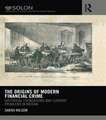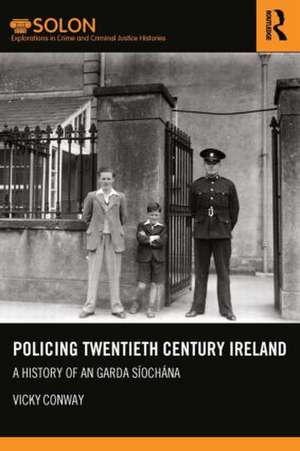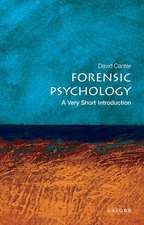Policing Twentieth Century Ireland: A History of An Garda Síochána: Routledge SOLON Explorations in Crime and Criminal Justice Histories
Autor Vicky Conwayen Limba Engleză Paperback – 22 mai 2015
Beginning with an overview of policing in pre-independence Ireland, this book chronologically charts the history of policing in Ireland. It presents data from oral history interviews with retired gardaí who served between the 1950s and 1990s, giving unique insight into the experience of policing Ireland, the first study of its kind in Ireland. Particular attention is paid to the difficulties of transition, the early encounters with the IRA, the policing of the Blueshirts, the world wars, gangs in Dublin and the growth of drugs and crime. Particularly noteworthy is the analysis of policing the Troubles and the immense difficulties that generated.
This book is essential reading for those interested in policing or Irish history, but is equally important for those concerned with the legacy of colonialism and transition.
| Toate formatele și edițiile | Preț | Express |
|---|---|---|
| Paperback (1) | 466.88 lei 6-8 săpt. | |
| Taylor & Francis – 22 mai 2015 | 466.88 lei 6-8 săpt. | |
| Hardback (1) | 1062.62 lei 6-8 săpt. | |
| Taylor & Francis – 6 aug 2013 | 1062.62 lei 6-8 săpt. |
Din seria Routledge SOLON Explorations in Crime and Criminal Justice Histories
-
 Preț: 332.70 lei
Preț: 332.70 lei -
 Preț: 311.41 lei
Preț: 311.41 lei -
 Preț: 326.49 lei
Preț: 326.49 lei -
 Preț: 310.95 lei
Preț: 310.95 lei -
 Preț: 411.42 lei
Preț: 411.42 lei -
 Preț: 436.14 lei
Preț: 436.14 lei -
 Preț: 449.41 lei
Preț: 449.41 lei -
 Preț: 341.55 lei
Preț: 341.55 lei -
 Preț: 432.12 lei
Preț: 432.12 lei - 23%
 Preț: 351.68 lei
Preț: 351.68 lei -
 Preț: 388.42 lei
Preț: 388.42 lei -
 Preț: 387.91 lei
Preț: 387.91 lei -
 Preț: 371.30 lei
Preț: 371.30 lei -
 Preț: 382.86 lei
Preț: 382.86 lei -
 Preț: 385.71 lei
Preț: 385.71 lei -
 Preț: 383.17 lei
Preț: 383.17 lei -
 Preț: 349.53 lei
Preț: 349.53 lei -
 Preț: 389.66 lei
Preț: 389.66 lei -
 Preț: 389.66 lei
Preț: 389.66 lei - 18%
 Preț: 1116.38 lei
Preț: 1116.38 lei
Preț: 466.88 lei
Nou
Puncte Express: 700
Preț estimativ în valută:
89.34€ • 93.27$ • 73.94£
89.34€ • 93.27$ • 73.94£
Carte tipărită la comandă
Livrare economică 05-19 aprilie
Preluare comenzi: 021 569.72.76
Specificații
ISBN-13: 9781138899988
ISBN-10: 1138899984
Pagini: 296
Ilustrații: 11 black & white illustrations, 8 black & white tables, 11 black & white line drawings
Dimensiuni: 156 x 234 x 15 mm
Greutate: 0.4 kg
Ediția:1
Editura: Taylor & Francis
Colecția Routledge
Seria Routledge SOLON Explorations in Crime and Criminal Justice Histories
Locul publicării:Oxford, United Kingdom
ISBN-10: 1138899984
Pagini: 296
Ilustrații: 11 black & white illustrations, 8 black & white tables, 11 black & white line drawings
Dimensiuni: 156 x 234 x 15 mm
Greutate: 0.4 kg
Ediția:1
Editura: Taylor & Francis
Colecția Routledge
Seria Routledge SOLON Explorations in Crime and Criminal Justice Histories
Locul publicării:Oxford, United Kingdom
Public țintă
Postgraduate and UndergraduateCuprins
1. Colonialism and politicised policing, 2. An Garda Siochana: An ill-concieved birth, 3. The 1930s and 40s: Transition and political policing, 4. The 1950s and 60s: a policeman's paradise?, 5. The Troubles and policing Ireland, 6. The special branch and the Troubles, 7. The end of the century: policing change, 8. The twenty-first century: scandal, austerity, reform and managerialism.
Recenzii
"This is an interesting book on the police force of the Republic of Ireland, An Garda Síochána, and forms a valuable contribution to our knowledge of policing within the British Isles. Conway traces the development of the Garda from independence in the early 1920s through the Troubles and to adjusting to a rapidly changing society in recent decades while facing several scandals. It is an engaging analysis of an under-researched force which emerged from British colonial policing and uniquely served as a pillar of reconstruction in post-independence Irish society."
Maurice Punch, Visiting Professor, King`s College London and London School of Economics
"Policing Twentieth Century Ireland is a must-read for scholars of Irish policing and of policing scholars more generally. Policing in Ireland has left its fingerprints on policing practices across the globe and this authoritative and well-written book sheds new light on a history of policing so intermeshed with the nature and development of the state, conflict and social change. It is a welcome addition for criminologists, sociologists, lawyers and historians."
Sharon Pickering, Australian Research Council Professorial Future Fellow and Professor of Criminology, Monash University
"In this book Dr Vicky Conway paints a rich and valuable picture of policing in Ireland over the last 100 years. It is highly readable, well informed and thoughtful, and will be invaluable to anyone interested in Irish policing or curious about criminal law enforcement in states that have undergone a transition from colonial to independent rule. It throws wonderful light in particular on the colonial and post-colonial determinants that have shaped – and continue to shape – the governance and legitimacy of policing in Ireland. Employing post-colonial theory as one tool of analysis, Conway provides an insight not ordinarily captured in conventional Anglo-American policing histories. She seamlessly weaves the personal accounts of 42 retired members of the Irish police force with more academic analyses, ensuring a rich and nuanced commentary. Combining the personal with the scholarly, and the historical with the conceptual, this book is both original and compelling."
Shane Kilcommins, Professor of Law, University College Cork
"Overall, this is an excellent addition to the policing literature which should be required reading for sociologists, criminologists and historians of policing. It is very well written with impeccable research combining documentary and oral evidence. Conway has read widely across both the history and sociology of policing, and brings a compelling analytical and theoretical framework to bear on the history of Irish policing."
Dean Wilson, SOLON: Interdisciplinary Studies in Law,Crime and History
Maurice Punch, Visiting Professor, King`s College London and London School of Economics
"Policing Twentieth Century Ireland is a must-read for scholars of Irish policing and of policing scholars more generally. Policing in Ireland has left its fingerprints on policing practices across the globe and this authoritative and well-written book sheds new light on a history of policing so intermeshed with the nature and development of the state, conflict and social change. It is a welcome addition for criminologists, sociologists, lawyers and historians."
Sharon Pickering, Australian Research Council Professorial Future Fellow and Professor of Criminology, Monash University
"In this book Dr Vicky Conway paints a rich and valuable picture of policing in Ireland over the last 100 years. It is highly readable, well informed and thoughtful, and will be invaluable to anyone interested in Irish policing or curious about criminal law enforcement in states that have undergone a transition from colonial to independent rule. It throws wonderful light in particular on the colonial and post-colonial determinants that have shaped – and continue to shape – the governance and legitimacy of policing in Ireland. Employing post-colonial theory as one tool of analysis, Conway provides an insight not ordinarily captured in conventional Anglo-American policing histories. She seamlessly weaves the personal accounts of 42 retired members of the Irish police force with more academic analyses, ensuring a rich and nuanced commentary. Combining the personal with the scholarly, and the historical with the conceptual, this book is both original and compelling."
Shane Kilcommins, Professor of Law, University College Cork
"Overall, this is an excellent addition to the policing literature which should be required reading for sociologists, criminologists and historians of policing. It is very well written with impeccable research combining documentary and oral evidence. Conway has read widely across both the history and sociology of policing, and brings a compelling analytical and theoretical framework to bear on the history of Irish policing."
Dean Wilson, SOLON: Interdisciplinary Studies in Law,Crime and History
Descriere
This book critically evaluates the creation of the new police force, an Garda Síochána, in the 1920s and analyses how this institution was influenced by and responded to substantial changes in Ireland.











